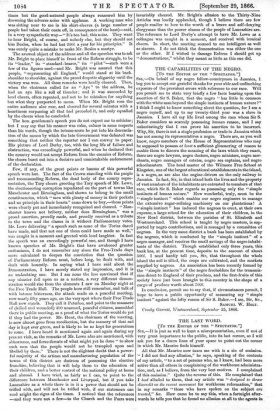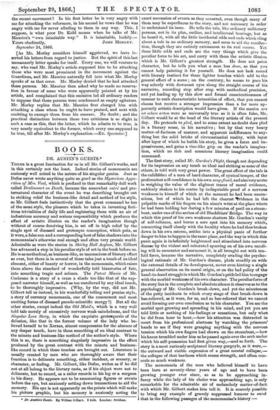THE LAST WORD.
CFO THE EDIT9R 9F THE "SPECTATOR."]
SIR,—It i8 just as well to hunt a misrepresentation, even if not of very great importance to the public, into its last corner, so I will ask you for a dozen lines of your space to point out the corner in which Mr. Maurice finds himself.
All that Mr. Maurice now taxes me with is a sin of omission. "I did not find any allusion," he says, speaking of the contents of my article, "to a set of persons who, as I knew, had been more active than all others in complaining of the workhouse administra- tion, and, as I believe, from the very best motives. I complained of this omission." Quite the reverse of this. He complained that I had alluded to them, that my article was "designed to throw discredit on the recent movement for workhouse reformation," that in my remarks "those who have spoken on the subject are treated," &c. How came he to say this, when a fortnight after- wards he tells you that he found no allusion at all to the agents in
the recent movement? In his first letter he is very angry with me for attacking the reformers, in his second he vows that he was angry with me for never alluding to them in any way. This, I suppose, is what poor Dr. Kidd means when he talks of Mr.
"own inimitable way." It is inimitable, luckily.—
[As Mr. Morley considers himself aggrieved, we have in- serted his letters from regard to justice. But the spirit of this last unmannerly letter speaks for itself. Every one, we will venture to say, who read Mr. Morley's article supposed him to be attacking those who were most prominent in the movement against the Guardians, and Mr. Maurice naturally fell into what Mr. Morley speaks of as that error. Mr. Morley denied that he had attacked these persons. Mr. Maurice then asked why he made no reserva- tion in favour of some who were apparently pointed at by his article, and complained that this omission led all ordinary readers to suppose that these persons were condemned as empty agitators. Mr. Morley replies that Mr. Maurice first charged him with attacking a class whom he ought to have praised, and next with omitting to exempt-them from his censure. No doubt ; and the practical distinction between these two criticisms is so slight in such a case as this, that the latter, which he admits to be true, is very nearly equivalent to the former, which every one supposed to be true, till after Mr. Morley's explanation.—En. Spectator.]































 Previous page
Previous page